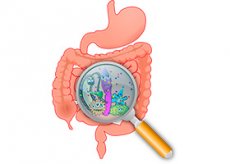New publications
"Good" bacteria in the gut can become harmful
Last reviewed: 02.07.2025

All iLive content is medically reviewed or fact checked to ensure as much factual accuracy as possible.
We have strict sourcing guidelines and only link to reputable media sites, academic research institutions and, whenever possible, medically peer reviewed studies. Note that the numbers in parentheses ([1], [2], etc.) are clickable links to these studies.
If you feel that any of our content is inaccurate, out-of-date, or otherwise questionable, please select it and press Ctrl + Enter.

A lot of previously conducted scientific research has shown that bacteria in the intestines "control" the health of the entire body. For example, they serve as both a preventative and a trigger (depending on the conditions and balance of microflora) for the development of oncological diseases, diabetes, and neuroses. In order to improve the qualitative and quantitative bacterial composition, any grocery store and even a pharmacy offers a variety of yogurts, curds, and even ice cream that contain probiotic additives. However, researchers from Washington (St. Louis University) have discovered that initially beneficial probiotics can change and even acquire harmful properties.
It would seem that there is nothing strange about this: bacteria adapt to different living conditions and change their activity or direction of action. As one of the study’s authors, Gautam Dantas, explains, people who seek to use microorganisms as a therapeutic agent should understand that their action can change depending on the conditions. “There are no bacteria that are insensitive to evolutionary changes. However, this does not mean that people should stop taking prebiotics.”
To find out the factors that influence the fact that "good" bacteria become dangerous, specialists had to introduce the probiotic E. Coli Nissle into the intestines of rodents with different initial quality of microflora and different nutritional principles. After a month and a half of the experiment, the researchers checked the DNA of the introduced bacteria and noted that in healthy rodents, there was no functional change in the microbes, but in obviously sick animals such changes were present. For example, specialists saw that the bacteria became resistant to antibiotics, and some microorganisms developed the ability to absorb mucus inside the intestine, preventing its natural defense.
"The healthy intestinal flora did not show any significant changes - perhaps because such conditions are considered adequate for probiotic bacteria. But it should be understood: in the vast majority of cases, probiotic drugs are not prescribed to healthy people, but only to sick people, those who have an imbalance of intestinal flora. And it is precisely in such disturbed conditions that probiotics become harmful," says Aura Ferreiro, head of the study.
Gautam Dantas believes that based on the results of the project, no one will cancel probiotics for the treatment of dysbacteriosis. On the contrary, the discovery will give new goals to scientists: for example, doctors will be able to prescribe certain drugs depending on the state of a person's intestinal microflora.
Information is presented on the pages of hi-news.ru
